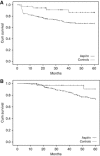Aspirin as a neoadjuvant agent during preoperative chemoradiation for rectal cancer
- PMID: 26372700
- PMCID: PMC4647877
- DOI: 10.1038/bjc.2015.336
Aspirin as a neoadjuvant agent during preoperative chemoradiation for rectal cancer
Abstract
Background: Recently, many studies have suggested a possible adjuvant role of aspirin in colorectal cancer, reporting a positive prognostic effect with its use in patients with established disease. The aim of this study was to investigate the anticancer effect of aspirin use during preoperative chemoradiation for rectal cancer.
Methods: Two hundred and forty-one patients with stage II-III rectal cancer and candidates for chemoradiation (CRT) were selected and assigned to two groups: group 1, patients taking aspirin at the time of diagnosis, and group 2, all others. Treatment and oncological outcomes were explored.
Results: Aspirin use was associated with a higher rate of tumour downstaging (67.6% vs 43.6%, P=0.01), good pathological response (46% vs 19%; P<0.001), and a slightly, although not significant, higher rate of complete pathological response (22% vs 13%; P=0.196). Aspirin use was also associated with a better 5-year progression-free survival (86.6% vs 67.1%; hazard rate (HR)=0.20; 95% CI=0.07-0.60) and overall survival (90.6% vs 73.2%; HR=0.21; 95% CI=0.05-0.89). Although chance of local relapse was similar (HR=0.6; 95% CI=0.06-4.5), aspirin use was associated with a lower risk of developing metastasis (HR=0.30; 95% CI=0.10-0.86).
Conclusions: Aspirin might have anticancer activity against rectal cancer during preoperative CRT. This finding could be clinically relevant and should be further investigated with randomised trials.
Figures
References
-
- Algra AM, Rothwell PM (2012) Effects of regular aspirin on long-term cancer incidence and metastasis: a systematic comparison of evidence from observational studies versus randomised trials. Lancet Oncol 13(5): 518–527. - PubMed
-
- Aschele C, Cionini L, Lonardi S, Pinto C, Cordio S, Rosati G, Artale S, Tagliagambe A, Ambrosini G, Rosetti P, Bonetti A, Negru ME, Tronconi MC, Luppi G, Silvano G, Corsi DC, Bochicchio AM, Chiaulon G, Gallo M, Boni L (2011) Primary tumor response to preoperative chemoradiation with or without oxaliplatin in locally advanced rectal cancer: pathologic results of the STAR-01 Randomized Phase III Trial. J Clin Oncol 29(20): 2773–2780. - PubMed
-
- Ashktorab H, Dawkins FW, Mohamed R, Larbi D, Smoot DT (2005) Apoptosis induced by aspirin and 5-fluorouracil in human colonic adenocarcinoma cells. Dig Dis Sci 50(6): 1025–1032. - PubMed
-
- Baron JA, Cole BF, Sandler RS, Haile RW, Ahnen D, Bresalier R, McKeown-Eyssen G, Summers RW, Rothstein R, Burke CA, Snover DC, Church TR, Allen JI, Beach M, Beck GJ, Bond JH, Byers T, Greenberg ER, Mandel JS, Marcon N, Mott LA, Pearson L, Saibil F, van Stolk RU (2003) A randomized trial of aspirin to prevent colorectal adenomas. N Engl J Med 348(10): 891–899. - PubMed
Publication types
MeSH terms
Substances
LinkOut - more resources
Full Text Sources
Other Literature Sources
Research Materials


